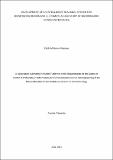| dc.description.abstract | Events such as poaching, accidents, unexpected adverse health events (e.g., heart problems,
seizures, heart stroke, dizziness, breathing problems, bleeding and broken bones) have adverse
impact on animals’ health. Many of such events, if known to someone in a position to assist the
animal, can be avoided, minimized or ameliorated. Unfortunately, many events occur in a
manner in which assistance is unavailable or provided too late. In regard to this, measures
needed include improving systems and methods for avoiding or reducing the impact of such
adverse events.
The study developed an intelligent real-time tracking system for monitoring rhinos and
elephant. It was guided by four specific objectives: reviewing and analyzing the existing
systems for tracking animals and proposing new more intelligent systems, designing of smart
sensing system for animal emotions recognition, developing computational models’ analysis
of wildlife tracking system for optimality, and developing an intelligent wildlife collar
information management system using mobile application. The first objective was
accomplished by conducting a cross-sectional study, and one-time data collection at
Ngorongoro Conservation Area, Tanzania. The second objective was completed by designing a
modern smart sensing animal collar belt that can recognize animal emotions. The third objective
was performed by attenuation models-based analysis of wildlife tracking system for optimality.
And the fourth objective was accomplished by developing a mobile application that collects
periodical sensor output responses from tracked elephant/rhino with their GPS locations.
All developed solutions were promising and can be utilized on improvement of the current
existing ant-poaching system. The solutions can be considered as a proof of concept, which needs
to be developed further for use in final product. | en_US |

